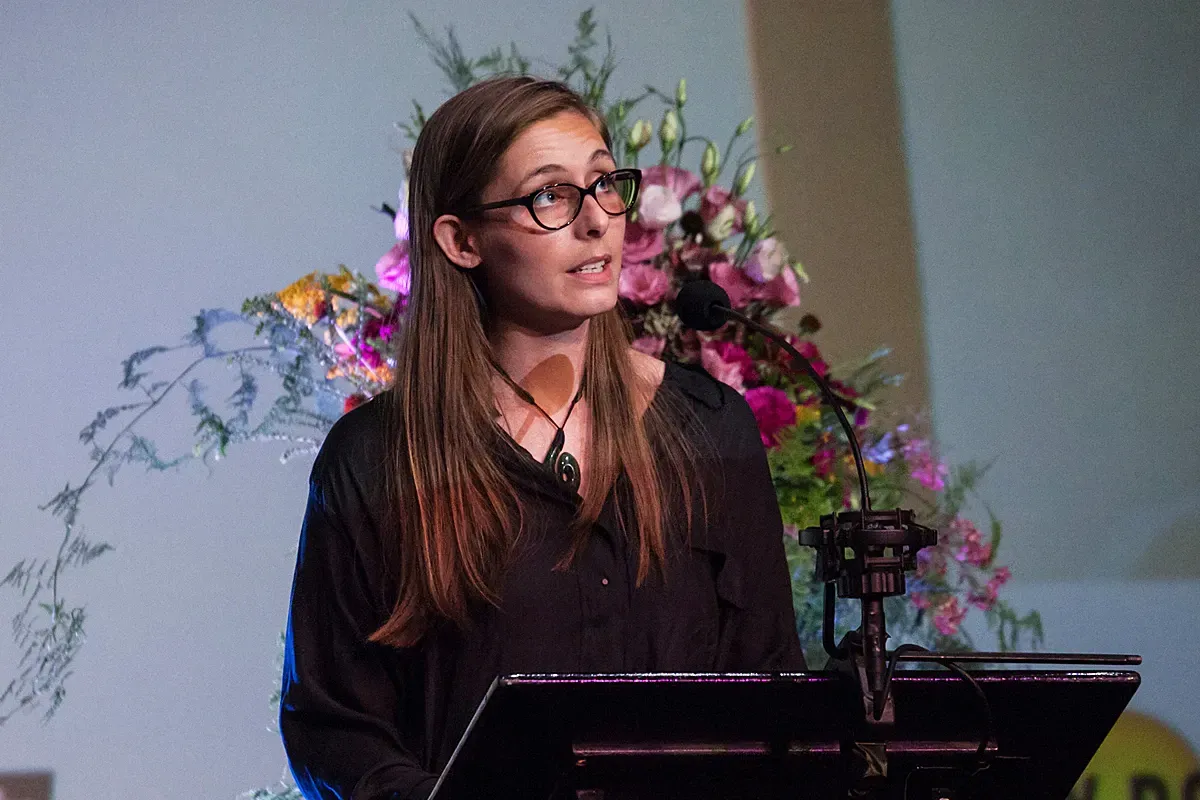NZ Fest Digest: Time with Catton
Written by

By Renee Gerlich, NZ Festival Writers Week
“Ambition is the desire for permanent change,” says Eleanor Catton at her New Zealand Book Council lecture. The topic is the role of change in fiction. Not one to give any subject superficial treatment however, NZ's Man Booker Prize-winner begins with the physics.
Because even the most ambitious of us are subject to the two primary laws of thermodynamics: that energy can be transformed but not created or destroyed; and that everything that is not in equilibrium is in a state of entropy.
Having begun with thermodynamics, she must proceed toward literary fiction by way of space-time and wave particle theory. To listen is not to wait for the point, though: having meditated so deeply on time, Catton is not out to waste a minute of ours in this full house at the Embassy Theatre. Having suspected as much, many of us sit with notebooks open and pens poised. Pointless: the lecture roots its listeners so firmly in the present that it effectively precludes any useful note taking. Surrendering to the current was the only option: it was impossible to extract oneself for long enough to linger on words already swum by.
Appropriate, as The Luminaries author is discussing how space and time find their sole point of convergence in the present moment. The past is merely space, residual matter: echoes, imprints, lingering aroma, the products of moments that cannot be re-entered and altered. The future exists only as time: a point at which we are moving toward by virtue of aforementioned second thermodynamic law, without it existing as material in space.
Catton's discussion of time and to an extent, its linearity, seems to underpin an argument for the importance of plot in fiction. She argues that plot is one of many elements of storytelling the discourse undervalues. It is viewed as subordinate to the nuanced, well observed and believable characters, which must purportedly be any story's driver.
Catton does not fully explain the reason for this bias. Perhaps contemporary fiction considers life as taking place primarily in human minds rather than objective time, and these minds are so often in virtual spaces. In past and future too, which are confused since while any character is located in a situation, she is a product of her aspirations as well as the past she still remembers, but not in full. Perhaps the idea is that authors should not write as though the course of life is carved out through intelligent design. Should refrain from the tyranny of subjecting such diversely free-thinking characters to their prescriptive plot planning. From patronising readers with those 'algebraic' truisms that often inspire narrative structures, like 'the sky is always darkest before dawn', or 'be careful what you wish for'.
Catton seems to find this perspective on plot and its concomitant values and taboos rather lacklustre. It also frowns on heroes, on magic and happy endings, and by implication such experiences as real love. Catton says the same academic position that subordinates plot to character seriously constrains what can be depicted and explored of the human spirit in literary fiction. She suggests that fiction has the capacity expand as well as moderate the expectations we collectively and individually hold of our own spirits and their transformative capacity.
The movement toward a happy ending is not an exercise in facile optimism ignorant of life's nuances, she seems to say. When done well, it is a testament to human ingenuity, which is the vehicle of insight, insight being what makes reading rewarding. This reward is after all what literature brings to us that we cannot experience in our normal, real, everyday, believable lives.
Catton almost echoes Paulo Freire in her humanist pronouncements on the workings of fiction. Plot requires that a character is initially situated within a limiting situation. In tragedy (Catton discusses Shakespeare's) these are seemingly surmountable, yet the character is defeated; in comedy, they are seemingly insurmountable, but insight delivered through ingenuity brings triumph. Tragedy, says Catton moves toward self-absorption where comedy moves toward self-awareness. Catton uses an analysis of Shakespeare's work and a critique of literary critic Harold Bloom's to affirm not only the importance of plot, but also its life affirming capacity. It is a stirring if not evangelical argument.
Literature is spiritual, she says. No doubt a highly unfashionable word in literary circles: Bill Manhire is oft-quoted as saying the Institute of Modern Letters he directed until last year “holds nothing as grand as a philosophy”. The authority Catton speaks with however, gained through her crystal eloquence, conviction and unassuming demeanour, will perhaps immediately grant it currency. If it was unfashionable in literary circles yesterday, perhaps things have already begun to change.
The 2014 New Zealand Book Council Lecture by Eleanor Catton was held at Embassy Theatre, Wellington, March 10, as part of New Zealand Festival Writers Week.